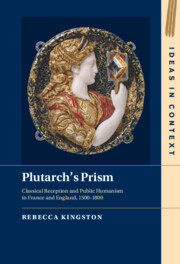Book contents
- Plutarch’s Prism
- Ideas in Context
- Plutarch’s Prism
- Copyright page
- Contents
- Figures
- Preface
- Acknowledgements
- Introduction
- Part I Setting the Stage
- Part II Plutarch in Renaissance France and England
- Chapter 3 Plutarch in Early French Renaissance Public Humanism: Geoffroy Tory and Guillaume Budé
- Chapter 4 Plutarch in Early French Renaissance Public Humanism: Desiderius Erasmus and Claude de Seyssel
- Chapter 5 Tudor Plutarch
- Chapter 6 Plutarch in Later French Humanism and Reformation: Georges de Selve, Jacques Amyot and Jean Bodin
- Chapter 7 Bernard de Girard Du Haillan and Michel de Montaigne on Thinking Through the Public Good in a Time of Civil Discord
- Part III Seventeenth- and Eighteenth-Century Plutarch
- Bibliography
- Index
Chapter 4 - Plutarch in Early French Renaissance Public Humanism: Desiderius Erasmus and Claude de Seyssel
from Part II - Plutarch in Renaissance France and England
Published online by Cambridge University Press: 22 September 2022
- Plutarch’s Prism
- Ideas in Context
- Plutarch’s Prism
- Copyright page
- Contents
- Figures
- Preface
- Acknowledgements
- Introduction
- Part I Setting the Stage
- Part II Plutarch in Renaissance France and England
- Chapter 3 Plutarch in Early French Renaissance Public Humanism: Geoffroy Tory and Guillaume Budé
- Chapter 4 Plutarch in Early French Renaissance Public Humanism: Desiderius Erasmus and Claude de Seyssel
- Chapter 5 Tudor Plutarch
- Chapter 6 Plutarch in Later French Humanism and Reformation: Georges de Selve, Jacques Amyot and Jean Bodin
- Chapter 7 Bernard de Girard Du Haillan and Michel de Montaigne on Thinking Through the Public Good in a Time of Civil Discord
- Part III Seventeenth- and Eighteenth-Century Plutarch
- Bibliography
- Index
Summary
In Chapter 4, I continue my study of the reception of Plutarch’s work in the French Renaissance. First, I discuss how Desiderius Erasmus (1466–1536) was introduced to Plutarch’s work at the press of Aldus Manutius in Venice and his subsequent work translating several of Plutarch’s texts into Latin. I demonstrate how the subsequent vernacular translations of Erasmus’s Latin work, including his Education of a Christian Prince, and his translation of Plutarch’s Apophthegmata or Sayings of Kings and Commanders had a different presence in the French and English contexts. I also explore the interesting case of Claude de Seyssel (1450–1520) who drew on the Latin translations of Plutarch by Jean Lascaris of the Lives of Antony and Demetrius to complete his vernacular translations of Appian and Diodorus Siculus. I demonstrate connections between Seyssel’s work on these translations and his later political reflections in his treatise The Monarchy of France while deepening my analysis of the contours of public humanism.
Keywords
- Type
- Chapter
- Information
- Plutarch's PrismClassical Reception and Public Humanism in France and England, 1500–1800, pp. 148 - 194Publisher: Cambridge University PressPrint publication year: 2022

